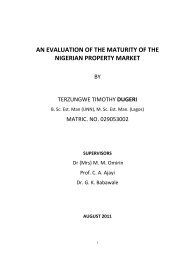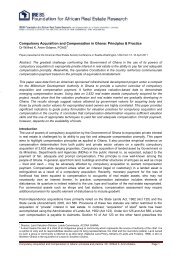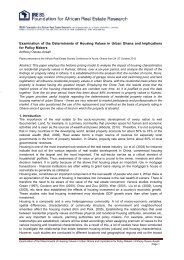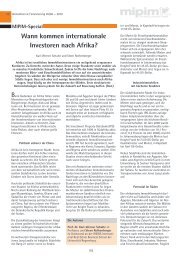Create successful ePaper yourself
Turn your PDF publications into a flip-book with our unique Google optimized e-Paper software.
workmen’s compensation as well as with the Social SecurityCommission. Trading licences are not required.Exchange ControlsAfter independence, Namibia remained part of the South<strong>Africa</strong>n Rand Common Monetary Area which also includes South<strong>Africa</strong>, Lesotho and Swaziland. Although the Namibian Dollarwas introduced as the country’s official currency in 1993, theSouth <strong>Africa</strong>n Rand remains legal tender for an indefinite period.The two currencies are also freely exchangeable on a one for onebasis in Namibia. For as long as Namibia remains part of theCommon Monetary Area, its foreign exchange transactions mustbe conducted in accordance with South <strong>Africa</strong>n exchangecontrol policies and regulations. If Namibia withdraws from theCommon Monetary Area, it is likely that exchange controlprovisions similar to those in South <strong>Africa</strong> will be introduced.Exchange control in Namibia is administered by the Bank ofNamibia (the central bank of Namibia) in conjunction with theSouth <strong>Africa</strong>n Reserve Bank, and through authorised dealers,commercial and merchant banks.Exchange control approval is required for all transactions byNamibian residents (whether natural or juristic persons) whichinvolve the transfer of assets to countries outside the CommonMonetary Area. Residents are not allowed to transact businessin foreign currencies. Transactions may be invoiced in foreigncurrencies, but payments must be made in local currency.There are also certain limitations on the amount of localcurrency available for residents each year in respect of foreigntravel and study.With regard to non-residents:no restrictions apply when foreign funds are introducedinto Namibia as share capital;share certificates must be endorsed “Non-Resident”;companies owned by non-residents should observe a ratioof share capital to fixed assets of 1:1;the introduction of loan funds from abroad is subject tospecific exchange approval.TaxationNormal tax is levied on the taxable income accruing tocompanies, trusts and individuals from sources within ordeemed to be within Namibia. The standard corporate tax rate isa flat tax rate of 35%. Individuals are taxed on a sliding scale. Themaximum tax rate for individuals is 36%. Insurance companiesare effectively taxed at 14% of investment income and miningcompanies at 37.5% (although diamond mines are effectivelytaxed at 55%). There is no capital gains tax or estate duty. There isno taxation on local dividends from companies and distributionsfrom close corporations paid to residents, but dividendsaccruing to foreign residents are subject to a non-residentshareholders’ tax of 10%. Non-resident shareholder’s tax of 10%is deducted from dividends received by non-residentshareholders that do not carry on business in Namibia. Royaltiespaid to non-residents are subject to a 10.5% withholding tax.Double tax agreements may override Namibian withholdingtaxes as well as taxation of deemed sourceincome. Namibia has double tax treaties withBotswana, France, Germany, India, Malaysia,Mauritius, Romania, Russia, South <strong>Africa</strong>,Sweden and the UK. Namibia is currentlynegotiating treaties with Belgium, the58Seychelles, Singapore, Zambia and Zimbabwe.VAT is charged at an effective rate of 15%. The import of goodsor services is subject to VAT at 15% unless the goods or servicesare exempt. Imports by areas declared as Export ProcessingZones are exempt from VAT. The export of goods is not subject toVAT. Customs duty is also payable.Legal SystemNamibian law is based on Roman and Roman-Dutch law and is,because of the country’s history, influenced by South <strong>Africa</strong>n lawand, to a certain extent, by German and English law. Because theNamibian legal system shares its roots with the South <strong>Africa</strong>nlegal system and has developed in close connection to the South<strong>Africa</strong>n legal system, much use is made of South <strong>Africa</strong>n case lawand authorities when interpreting and applying Namibian law.Namibia adheres to the principles of the supremacy of theConstitution and the independence of the judiciary.Intellectual PropertyRights to intellectual property are protected under Namibianlaw, largely by statute, but also at common law. Some of thestatutes overlap with the common law and with each other.Patents and designs are governed by an old South <strong>Africa</strong>n Act,the Patents Designs, Trade Marks and Copyright Act 9 of 1916.Trademarks are governed by the Trademarks Act. Regulationsspecify the procedures to be followed by applicants, andprotection is afforded from the date of filing, if the application isgranted. The common law recognises that an unregistered markused by a trader which distinguishes such trader’s goods orservices from those of others is of a proprietary nature anddeserves protection. The Trademarks Act recognises suchcommon law rights by preserving the right to bring an action forpassing off of the unregistered mark.Any of the works listed in the Copyright and Neighbouring RightsProtection Act are eligible for copyright protection. Copyrightcomes into existence without registration and the Act prohibitsthe unauthorised reproduction, publication, broadcast,performance, transmission or adaptation of a literary, dramaticor musical work. Special provision is made for the protection ofartistic works, and of sound recordings, cinematograph films,television and sound broadcasts, published editions of worksand computer programs.Financial Services/InsuranceNamibia has a well-established insurance industry which is to agreat extent inherited from and interlinked with the South<strong>Africa</strong>n insurance industry. Insurance is divided into long-terminsurance (pertaining to life insurance, health, disability, funeralor sinking fund policies) and short-term insurance (relating tofire, marine, aviation, vehicles, guarantee and personal accident,sickness, general liability, damage to property, goods in transit,credit, railway rolling stock, legal expenses and expropriationand confiscation of property, personal and co-insurancebusiness). Long-term and short-term insurance and theregistration, cancellation and carrying on of business in relationthereto are regulated by the Long-Term Insurance Act and Short-Term Insurance Act. Most types of risk can be insured in Namibiaand the reinsurance business has gained a lot of ground in thecountry in recent years, in particular since the introduction ofthe State owned National Re-Insurance Company, NamibiaFinancial Institutions Supervisory Authority (NAMFISA).










